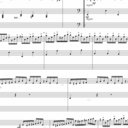Glutamine-enriched enteral diet enhances bacterial clearance in protected bacterial peritonitis, regardless of glutamine form.
Mots clés
Abstrait
BACKGROUND
The effects of glutamine (Gln)-enriched enteral diets on bacterial clearance were investigated in a rat protracted peritonitis model. The effects of the Gln form, peptide-based vs free amino acid-based, were also compared.
METHODS
Twenty-three rats underwent gastrostomy. An osmotic pump was implanted in the peritoneal cavity. The rats received a continuous intragastric infusion of one of three diets: Gln-depleted (Gln 0), Gln-enriched with the Gln in free amino acid form (Gln F), or Gln-enriched with the Gln in oligopeptide form (Gln P). The three formulas were isocaloric and isonitrogenous. The pumps delivered a continuous infusion of Escherichia coli, starting at 48 hours after implantation, for 24 hours. Then, the animals were killed.
RESULTS
Bacterial numbers in peritoneal lavaged fluid (PLF) and the liver were significantly lower in the Gln P and Gln F groups than in the Gln 0 group. The bacterial number in PLF correlated with that in the liver. Neither the number nor the population of peritoneal exudative cells differed among groups. Plasma levels of proline, alanine and citrulline were significantly higher in the Gln P and Gln F groups than in the Gln 0 group. Both Gln supplemented groups showed significantly greater villous height, crypt depth, and numbers of mitoses per crypt in the small intestine than the Gln 0 group.
CONCLUSIONS
Supplemental Gln enhances peritoneal and hepatic bacterial clearance, regardless of Gln form. Gln-enriched may be more beneficial than Gln-depleted enteral diets in peritonitis.


